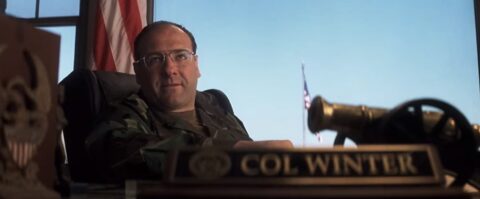Framing is power. It is also the illusion of power. Pay attention to the way Col. Winter (James Gandolfini) — the sadistic warden of a maximum security Military prison dubbed as “The Castle” — is framed. He’s mostly shot from below, towering over his desk like a school principal Hitler. The Triumph of the Will (Leni Riefenstahl, 1935) framing isn’t unintentional: it shows him both as he would like to be seen, and as he really is; a fascist who uses his institutional framing to convey the illusion of power while his real authority amounts to nothing.
Power in The Last Castle (Rod Lurie, 2001) is not a given. It’s earned. It’s the way you comport yourself and get other people to respect you. Mr Irwin (Robert Redford) may have been a general in a past life, but in this facility he is stripped of all his titles. He has no institutional power. People even take bets on when he might off himself. But crucially, he is framed mostly right on, the camera bestowing him with a relatable decency completely lacking in the mealymouthed Winter.
While Gandolfini — earning a smooth five million dollars here off the success of The Sopranos — is all squirmy gestures, drinking Diet Cokes like a proto-President Trump, Redford turns on his everyman charm, effortlessly sharing anecdotes and aphorisms, winning over the hardened criminals before installing his own chain of command within the hitherto racially divided institution.
Irwin tries to break him. In a rip-off of Cool Hand Luke’s (Stuart Rosenberg, 1967) iconic egg scene, Irwin must lug rocks from one side of the prison yard to the other. He makes it. He inspires his inmates not just to lug rocks, but to build a proper wall; and Winter, upset by Irwin’s success, knocks it down. An inmate protests and is shot and killed by a rubber bullet to the head.
Winter, sensing the tides of change, tries to make a deal — now the men can sort of salute Irwin through running their hands through their hair; and they can call him “chief” in lieu of General; and he can basically run things in his own, limited way. Irwin still holds firm, demanding his full resignation. But no fascist ever gives complete control up that easily.
Chess metaphors abound in this pleasant two-hander, shot in the gothic-like Tennessee State Prison with classical enthusiasm by Shelly Johnson and scored with Aaron Copland-style trumpet runs by Jerry Goldsmith. But while all the pawns are moved with care, and the knights are set up to smartly take the rooks, the script rushes the checkmate, hurrying into action cliché when this was so obviously a proper actor’s picture.
While keenly understanding the subtle power of the camera to create archetypal character conflict, The Last Castle squanders its potential — storming the barricades before all the foundations are properly laid. We are left with a ruin; reminders of potential greatness in lieu of a lasting monument.

Redmond is the editor-in-chief of Journey Into Cinema.
